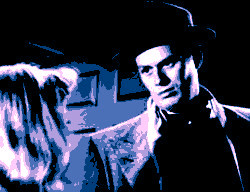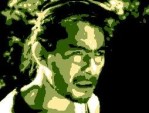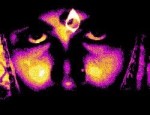Film Review
The Street with No Name adopts
the same semi-documentary approach as
The House on 92nd Street
(1945), depicting the activities of the FBI in a similarly realistic
vein, but this time the threat comes not from Nazi agents but from
home-grown gangsters. The bombastic introduction (which isn't
helped by a piece of wanton scare-mongering signed by J. Edgar Hoover)
has the unfortunate effect of making the film look like a promotional
piece for the FBI - the portentous voiceover extolling the virtues of
the government agency does as much to kill one's enthusiasm for the
film as it can. Having dispensed with this onerous duty (which
one suspects may have been foisted on the film's makers by the FBI in
return for their support), what starts out as a shameless piece of
government propaganda soon becomes a hard-edged noir drama which brings
a shocking new sense of reality to the old-fashioned gangster film.
In the early 1930s, a series of American gangster films that included
Little
Caesar (1931) and
The Public Enemy (1931) had
tended to glamorise gangsterism. Once the Production Code had
come into force, there was an attempt to paint organised crime in more
realistic and moral colours, and films such as William Keighley's
G Men (1935) made the
crime-fighting federal agents the heroes.
The Street with No Name, also
directed by Keighley (late in his career), goes even further in
stressing the destructive influence of gangsterism and the bravery of
those who put their lives on the line to combat it. Its
near-documentary style allows it to depict violence more realistically
than was the norm in American crime dramas of this time, and, in doing
so, the film anticipates the far grittier noir thrillers of the
1950s. It also lays the foundation for the modern gangster film,
which began, more or less, with Francis Ford Coppola's
The
Godfather (1972) and Martin Scorsese's
Mean
Streets (1973).
From a character and narrative perspective,
The Street with No Name offers few
surprises and hardly tries to be original. The plot is pretty
pedestrian and most of the characters are wafer-thin archetypes, with
one noticeable exception. Richard Widmark's Alec Stiles, the
central villain of the piece, is a chillingly authentic mob leader -
not the visibly deranged psychopath he had previously played in
Kiss of Death (1947), but a
horribly believable specimen of humanity for whom violent crime is a
religion, not just a career choice. It was clearly not the
intention of the film's makers that we should end up rooting for
Stiles, but, unattractive as Widmark makes him (in one scene he
violently slaps his wife in a way that is truly sickening), we cannot
help being fascinated by him.
Were it not that we had some sympathy with Widmark's monstrous
character, the film's ending would be just another predictable cops and
robbers shoot out, not the unbearably tense and harrowing set-piece
confrontation that Keighley manages (against all expectations) to
deliver. By contrast, Mark Stevens' FBI agent Gene Cordell is
just another stock good guy, colourless and uninteresting, so dull that
we hardly care what becomes of him. This is where Widmark's
career began in earnest - one of cinema's most charismatic and
uncompromising tough guys had given the FBI a good run for its money,
now it was Hollywood's turn...
© James Travers 2015
The above content is owned by frenchfilms.org and must not be copied.
Film Synopsis
As a new wave of crime burns its way across America in the aftermath of
WWII, FBI operatives are diligently engaged in combating organized
gangsterism that threatens the peace and security of the nation.
Two seemingly unrelated killings in Center City set FBI investigator
George A. Briggs on the trail of hoodlum Alec Stiles, who runs one of
the city's most notorious gangs. FBI undercover agent Gene
Cordell is assigned to infiltrate Stiles' gang and obtain the evidence
that will secure a conviction. With the help of a forged criminal
record, Cordell is able to join Stiles' gang, but after one attempt to
lure the gangster boss into a trap fails Stiles soon sees through the
deception...
© James Travers
The above content is owned by frenchfilms.org and must not be copied.



